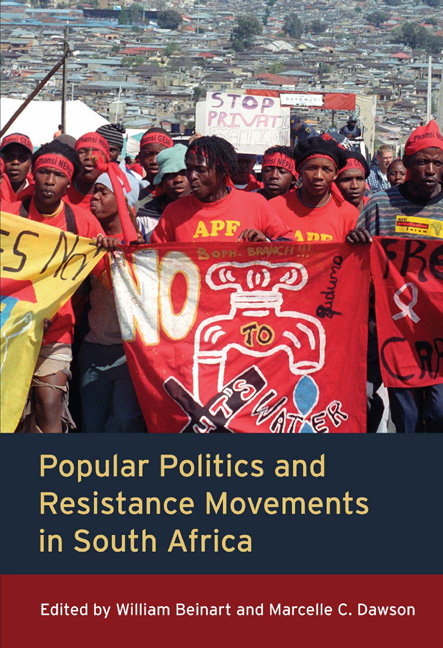Book contents
- Frontmatter
- Contents
- Contributors
- List of Abbreviations and Acronyms
- 1 Popular politics and resistance movements in South Africa, 1970–2008
- 2 The Durban strikes of 1973: Political identities and the management of protest
- 3 ‘There's more to it than slurp and burp’: The Fatti's & Moni's strike and the use of boycotts in mass resistance in Cape Town
- 4 The role of the African National Congress in popular protest during the township uprisings, 1984–1989
- 5 Strategies of struggle: The Nelson Mandela campaign
- 6 From removals to reform: Land struggles in Weenen in KwaZulu-Natal, South Africa
- 7 From popular resistance to populist politics in the Transkei
- 8 ‘It's a beautiful struggle’: Siyayinqoba/Beat it! and the HIV/AIDS treatment struggle on South African television
- 9 The Nelson Mandela Museum and the tyranny of political symbols
- 10 Black nurses’ strikes at Baragwanath Hospital, Soweto, 1948–2007
- 11 The ‘New Struggle’: Resources, networks and the formation of the Treatment Action Campaign (TAC) 1994–1998
- 12 New social movements as civil society: The case of past and present Soweto
- 13 ‘Phansi Privatisation! Phansi!’: The Anti-Privatisation Forum and ideology in social movements
- Endnotes
- Bibliography
- Index
8 - ‘It's a beautiful struggle’: Siyayinqoba/Beat it! and the HIV/AIDS treatment struggle on South African television
Published online by Cambridge University Press: 21 April 2018
- Frontmatter
- Contents
- Contributors
- List of Abbreviations and Acronyms
- 1 Popular politics and resistance movements in South Africa, 1970–2008
- 2 The Durban strikes of 1973: Political identities and the management of protest
- 3 ‘There's more to it than slurp and burp’: The Fatti's & Moni's strike and the use of boycotts in mass resistance in Cape Town
- 4 The role of the African National Congress in popular protest during the township uprisings, 1984–1989
- 5 Strategies of struggle: The Nelson Mandela campaign
- 6 From removals to reform: Land struggles in Weenen in KwaZulu-Natal, South Africa
- 7 From popular resistance to populist politics in the Transkei
- 8 ‘It's a beautiful struggle’: Siyayinqoba/Beat it! and the HIV/AIDS treatment struggle on South African television
- 9 The Nelson Mandela Museum and the tyranny of political symbols
- 10 Black nurses’ strikes at Baragwanath Hospital, Soweto, 1948–2007
- 11 The ‘New Struggle’: Resources, networks and the formation of the Treatment Action Campaign (TAC) 1994–1998
- 12 New social movements as civil society: The case of past and present Soweto
- 13 ‘Phansi Privatisation! Phansi!’: The Anti-Privatisation Forum and ideology in social movements
- Endnotes
- Bibliography
- Index
Summary
‘Without television, contemporary humanitarianism would not exist.’
Bernard Kouchner (founder of Médecins Sans Frontières)
Introduction
Siyayinqoba/Beat It! is a television magazine show for ‘everyone living with HIV, our partners, families and friends’. It is screened weekly on channel 1 of the South African Broadcasting Corporation (SABC) to approximately three million viewers. The audience ratings of the show have increased in correlation with HIV prevalence rates, thus signalling the increased demand for and consumption of HIV educational media in South Africa. The National AIDS Helpline revealed that there was a ‘dramatic increase’ in the number of calls it received subsequent to the airing of Beat It! episodes. Increased call numbers were sustained throughout the days on which episodes were screened and approximately a third of callers received the number through Beat It!, which includes an information bar about the helpline at the bottom of the screen. While South African television broadcasts a number of programmes that address HIV, Beat It! remains the only programme featuring a panel of HIVpositive participants and targeted specifically at an HIV-positive audience and, more generally, at a diverse South African public. The show is closely aligned with both the Treatment Action Campaign (TAC) and Médecins Sans Frontières (MSF), the leading HIV-focused non-governmental organisations (NGOs) in South Africa. It also has firm ties with numerous other organisations that have shaped the national response to the HIV/AIDS pandemic.
Beat It! has played a central role in public education about the struggle for access to treatment in South Africa. In late 2008 the show began its seventh series. Echoing many aspects of TAC discourse, the participants and producers of Beat It! have drawn frequent comparisons between the struggle for treatment access in South Africa and the anti-apartheid struggle. The treatment access movement has also been inspired by the radicalism of American AIDS activism embodied in the furious, media-savvy protests of the US-based AIDS Coalition to Unleash Power (ACT UP).
This chapter examines the historical links among ACT UP, the anti-apartheid movement and the treatment access movement in South Africa, focusing on the visual and discursive parallels that Beat It! draws among these three movements.
- Type
- Chapter
- Information
- Popular Politics and Resistance Movements in South Africa , pp. 161 - 188Publisher: Wits University PressPrint publication year: 2010



